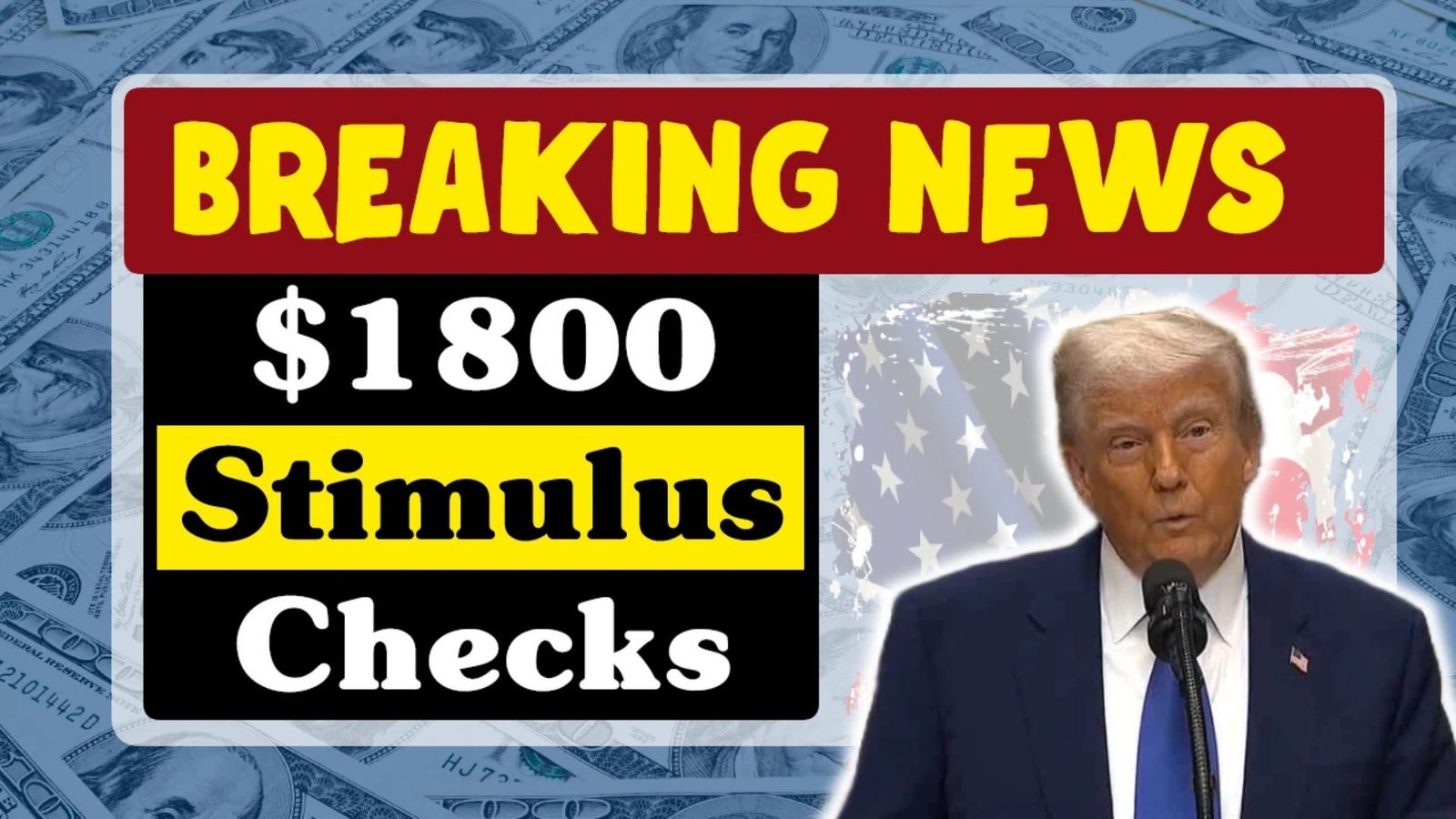discussions about stimulus checks have resurfaced, with many Americans, especially those receiving Social Security Income (SSI), Social Security Disability Insurance (SSDI), and Veterans Affairs (VA) benefits, wondering if they qualify for a potential $1,800 stimulus payment. This article provides comprehensive, original information on the eligibility criteria, payment schedules, and what beneficiaries need to know about these rumored financial relief measures. Stay informed about the latest updates on stimulus checks 2025 and how they may impact you.
What Are the $1,800 Stimulus Checks for 2025?
The concept of stimulus checks stems from government efforts to provide financial relief during economic hardships. While no official confirmation of a $1,800 stimulus check for 2025 has been announced by the U.S. government as of July 26, 2025, there is significant speculation based on past stimulus programs and ongoing economic challenges. These payments, if approved, could target specific groups, including SSI recipients, SSDI beneficiaries, and VA benefit recipients, to help offset inflation, rising costs, and other financial pressures.
Stimulus payments are typically distributed to stimulate economic activity or provide direct support to vulnerable populations. For those relying on fixed incomes like SSI, SSDI, or VA benefits, these payments could offer critical financial relief. Below, we explore the potential eligibility, payment timelines, and other key details.
Why Are Stimulus Checks Being Discussed in 2025?
The U.S. economy continues to face challenges such as inflation, increasing living costs, and economic uncertainty. For individuals on SSI, SSDI, or VA benefits, these issues can be particularly burdensome due to limited income sources. Advocacy groups and policymakers have proposed stimulus checks to address these concerns, with a focus on supporting low-income individuals and veterans. While no federal legislation has been finalized, the discussions highlight the need for targeted financial aid.
Eligibility for $1,800 Stimulus Checks in 2025
Eligibility for stimulus checks typically depends on income levels, tax filing status, and enrollment in specific federal programs. Based on previous stimulus programs and current speculation, here’s who might qualify for a $1,800 stimulus check in 2025:
1. SSI Recipients
- Supplemental Security Income (SSI) is a federal program providing financial assistance to low-income individuals who are aged, blind, or disabled.
- To qualify for a stimulus check, SSI recipients generally need to:
- Be enrolled in the SSI program.
- Have a valid Social Security Number (SSN).
- Meet income thresholds, which are typically aligned with SSI’s low-income criteria.
- Historically, SSI recipients have received stimulus payments automatically, without needing to file taxes, as long as they are registered with the Social Security Administration (SSA).
2. SSDI Beneficiaries
- Social Security Disability Insurance (SSDI) supports individuals with disabilities who have a work history.
- Eligibility for stimulus checks may include:
- Active enrollment in SSDI.
- A valid SSN.
- Income within specified limits, often based on adjusted gross income (AGI) from recent tax returns.
- Like SSI recipients, SSDI beneficiaries have typically received stimulus payments directly through the SSA.
3. VA Benefits Recipients
- Veterans receiving benefits through the Department of Veterans Affairs (VA), such as disability compensation, pensions, or survivor benefits, may also be eligible.
- Requirements could include:
- Current receipt of VA benefits.
- A valid SSN or Taxpayer Identification Number (TIN).
- No income cap in some cases, as VA benefits are often considered separately from taxable income.
- In past stimulus rounds, the VA has worked with the IRS to ensure payments reach veterans efficiently.
4. Additional Eligibility Factors
- Income Limits: Previous stimulus checks had income caps (e.g., $75,000 for individuals, $150,000 for married couples). If a $1,800 stimulus check is approved, similar thresholds may apply.
- Non-Tax Filers: Those who don’t file taxes, including many SSI and SSDI recipients, may still qualify based on SSA or VA records.
- Dependents: Some stimulus programs included payments for dependents, which could apply to families of VA or SSDI beneficiaries.
Payment Dates for 2025 Stimulus Checks
As of July 26, 2025, no official payment schedule for a $1,800 stimulus check has been confirmed. However, based on past stimulus rollouts, payments could follow these patterns:
Expected Timeline
- Announcement: If approved, Congress would likely announce the stimulus package in early 2025, with payments starting shortly after.
- Distribution Method:
- Direct Deposit: Beneficiaries with bank account information on file with the SSA or VA could receive payments first, potentially within weeks of approval.
- Paper Checks or Debit Cards: Those without direct deposit may receive payments via mail, which could take 4–8 weeks.
- SSI and SSDI Recipients: Payments are typically processed through the SSA, ensuring quick delivery to enrolled beneficiaries.
- VA Beneficiaries: The VA often coordinates with the IRS to distribute payments, which may follow a similar timeline.
Factors Affecting Payment Dates
- Legislative Approval: Stimulus checks require Congressional approval, which can delay implementation.
- Administrative Processing: The IRS, SSA, and VA need time to update systems and verify eligibility.
- Economic Conditions: Urgency driven by economic factors could accelerate the timeline.
How to Prepare for a 2025 Stimulus Check
To ensure you receive a stimulus check promptly, consider these steps:
- Update Contact Information:
- Ensure your bank account and mailing address are current with the SSA or VA.
- Use the IRS “Get My Payment” tool (if reactivated) to check payment status.
- Verify Eligibility:
- Confirm your enrollment in SSI, SSDI, or VA benefits.
- Check income limits if you file taxes.
- File Taxes (if applicable):
- Even if you’re not required to file taxes, submitting a simple return can help the IRS process your payment.
- Stay Informed:
- Monitor updates from reliable sources like the IRS, SSA, or VA websites for official announcements.
Common Questions About 2025 Stimulus Checks
Are Stimulus Checks Taxable?
- Based on previous stimulus programs, stimulus checks are typically not considered taxable income. However, consult a tax professional for personalized advice.
Will Non-Tax Filers Receive Payments?
- Yes, SSI, SSDI, and VA beneficiaries who don’t file taxes have historically received payments automatically through their program’s records.
Can I Receive a Stimulus Check If I Owe Back Taxes?
- In past rounds, stimulus payments were not offset by back taxes or federal debts, except in cases like child support. This policy could continue in 2025.
Why Stimulus Checks Matter for SSI, SSDI, and VA Recipients
For individuals relying on SSI, SSDI, or VA benefits, a $1,800 stimulus check could provide significant relief. These groups often face fixed incomes that struggle to keep pace with inflation and rising costs for essentials like housing, healthcare, and groceries. A stimulus payment could help cover:
- Medical Expenses: Especially for SSDI and VA recipients with ongoing healthcare needs.
- Daily Living Costs: Groceries, utilities, and transportation.
- Debt Repayment: Reducing financial strain for those with limited income.
Conclusion
While the $1,800 stimulus checks for 2025 remain speculative as of July 26, 2025, the potential for financial relief is a critical topic for SSI, SSDI, and VA benefits recipients. By understanding eligibility criteria, preparing for payments, and staying informed, you can position yourself to benefit from any forthcoming stimulus programs. Keep an eye on official government sources for updates, and take proactive steps to ensure your information is up to date with the SSA or VA.



